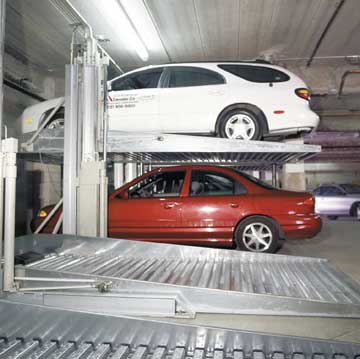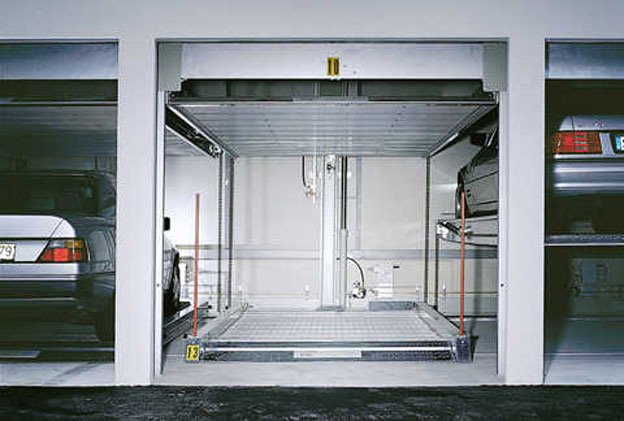Robert “Rob” Bailey president of Space Saver Parking Company, Mid-American Elevator Company, and USA Hoist Company, started in elevator business in 1982 as Salesman/Project Manager for Mid-American Elevator. Managed numerous projects including maintenance at O’Hare Field for over 100 elevators and escalators and $5,000,000 elevator and escalator construction contract at State of Illinois Center in Chicago. Initiated leveraged buyout of Mid-American from previous ownership in 1984. Assumed duties of President in 1984. Built company business from $1,500,000 per year to approximately $30,000,000 per year.
Designed and developed microcomputer based elevator control systems starting in 1985. Started Mid-American Elevator Equipment Company which now sells control systems to elevator contractors all over the world.
In 1992, Mid-American opened an office in Washington DC. In a Joint Venture with Tompkins Builders. Mid-American has performed over $75 million of renovation work in US Government Buildings.
In 1995, Mid-American purchased the assets of USA Hoist. USA Hoist is the largest contractor for outside construction elevators in the Midwest.
EXPO1000 - Can you give me a little background on Space Saver Parking?
ROB - Space Saver Parking company is a leader in providing innovative solutions to today’s complex parking problems. We started installing stackers in 1990 and in June of this year completed our first fully automated parking facility.
EXPO1000 - Tell me about stackers.
ROB - Stackers are your standard dependent parking platforms.
EXPO1000 - What do you mean by “dependent”?
ROB - This type of stacker requires that you have to move the bottom car to recover the top car. This system allows for doubling or tripling a single parking space.
EXPO1000 - How much will I pay to double a parking space?
ROB - If you only purchased one platform, it will cost about $10,000 and of course as the quantity increases the price goes down.
EXPO1000 - Is there any system that you can buy which doesn’t require moving the bottom vehicle?
ROB - Yes, we have several. If you can provide a pit of 6’, the bottom car can go into the pit. These “independent” systems will cost approximately $8,000 per space.
EXPO1000 - Do you have another solution that doesn’t require the excavation of a pit?
ROB - Sure, we have a “combi-lift” which is a combination of mechanical and an automated system. The vehicle is parked on a platform, the driver exits, and the platform moves sideways and vertically. This combines the advantages of vertical stacking and sideways movement to double or triple the number of spaces in the same area.
EXPO1000 - Now we’re getting into the exciting subject of automated parking. Our parking forum in Washington DC visited your installation at the Summit Grand Parc Apartments. We were all impressed, surprised, and fascinated watching this demonstration. Can you briefly describe to the unfortunate folks who didn’t see this installation?
ROB - Summit Grand Parc is luxury residential tower with 98 rental units and 24,000 sq. ft of commercial/retail space a few blocks from the White House on a very small footprint. This building was originally an office building on a 60’ x 106’ lot, without any parking.
Summit Grand Parc excavated 32’ or 4 levels and we installed 74 fully automated parking spaces.
EXPO1000 - Give me a idea of just how the automated garage works?
ROB - A single driveway provides access to the building at street level. Inside the building there are 2 entry/exit rooms and the vehicle storage area is under grade.
The patron enters the building with his garage door opener.
Inside the building he drives into one of the two entry/exit rooms. The patron drives onto a steel pallet that is flush to the floor. Channels are provided on each side of the pallet to guide the wheels, much like you see at a car wash.
The patron turns off the car, retrieves his belongings, passengers, pets, and keys and vacates the transfer compartment. Outside the room he activates the system by waving his encoded card at the card reader adjacent to the room. The door closes, senses the size of the vehicle, and confirms that room is unoccupied by people or pets.
The car is now resting on a pallet and the pallet is located on a turntable.
The car is ready to be automatically parked.
The turntable moves 45 degrees to line the vehicle up with the transport device. The car is lowered by a vertical lift and brought into the system by the SRU (Storage Retrieval Unit) that places the pallet and car into the assigned storage rack.
To retrieve the vehicle, the card is again read and the process starts with the car delivered to the entry/exit area on the turntable, this time facing the exit. The doors open and the car is ready for the owner to drive out.
EXPO1000 - Lets talk costs. How much did Summit Grand Parc spend for this installation?
ROB - The cost of the mechanical parking equipment without land, excavation, and building was $1.5 million or $20,000 per space.
EXPO1000 - How does this compare to ramp parking?
ROB - Ramp parking, in my opinion, is your most economical alternative but if you have a small footprint or no room to build, this is the only way to have parking spaces available - and in this case the only viable alternative.
EXPO1000 - So what you’re saying is that you don’t have the solution for all parking situations?
ROB - Right, but it solves many previously impossible situations. The Summit Grand Parc project could not have been built with any other parking solution.
EXPO1000 - Let’s talk about operating costs. What is the annual cost of maintaining such a system?
ROB - About $400 per space per year. This includes monthly preventative maintenance inspections and lubrication, and all required normal repairs. It includes call back service for trouble calls during normal working hours. It does not include repairs required for vandalism, misuse, flood, fire, etc.
EXPO1000 - How much should be set aside each year for capital reserves to fund future capital improvements?
ROB - The system will need a major renovation (new controls and replacement of most heavy wear parts) in 20 to 25 years. The cost of the renovation will be about 50% of the original purchase price adjusted for inflation.
EXPO1000 - How many human operators are needed to attend this system, and how many man-hours per day?
ROB - I would expect with a two hundred to three hundred car system that you would need two persons during normal working hours and one during nighttime hours -- approximately 32 man hours per day. This is just operators and does not include maintenance.
EXPO1000 - What qualifications and technical skills are required to operate and service the system?
ROB - Operators will need to be reasonably knowledgeable -- the upper end of the building engineer trade. Operators will need to learn to operate the computer controlled diagnostic system -- so they need to have a reasonable good level of computer literacy -- equivalent to a proficient Internet user. Operators will need three to five days training.
EXPO1000 - What happens when the system fails? How quickly can it be repaired?
ROB - Usually when the system fails, it will fail in a mode that will allow most or all of the automobiles to be accessed. We would expect that generally a mechanic would respond in one hour or less and that the average time to repair would be one hour or less.
EXPO1000 - What is the track record of this system with respect to reliability?
ROB - Track record of these systems is very good in Europe. Wohr has over 75 fully automated garages in operation with no failed installations. Availability is over 99%.
EXPO1000 - How does someone get more information?
ROB - For more information, call Jackie Smith at 773-486-6900
or send her e-mail at jackie@mid-americanelevator.com.
More information can be found on our web site www.SpaceSaverParking.com.By the way, Jackie will be hosting a bus tour of the Washington DC facility from the NPA Conference in Philadelphia on Wednesday, September 25th.
EXPO1000 - Once again, thank you for co-hosting our event in Washington, DC and for the automated parking garage tour.
For your information, one of our visitors said, “This was really a historical event for the parking industry. I felt a little like a witness on the windy sand dunes of Kitty Hawk watching the Wright Brothers first success. Space Saver has opened a new era all of us in the parking industry.”
ROB - Thank you very much for this opportunity and your forum.
###



